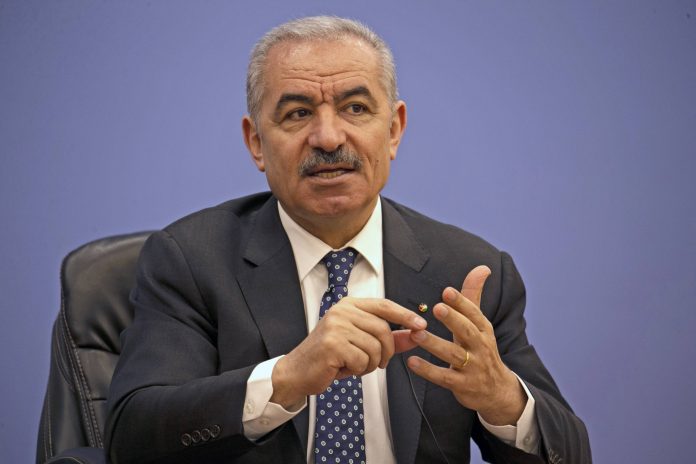
The Palestinians said Tuesday they proposed a demilitarized Palestinian state in the West Bank, Gaza and east Jerusalem with one-to-one land exchanges with Israel as a counteroffer to President Donald Trump’s Mideast plan.
Prime Minister Mohammad Shtayyeh declined to provide further details about the 4 1/2-page proposal but said the Palestinian position on major issues is well-known. He said the plan was submitted in recent days to the Quartet of Mideast mediators — the U.S., the U.N., the European Union and Russia.
The Trump administration has chastised the Palestinians for rejecting its plan, which sides with Israel on all the most contentious issues in the decades-old conflict. Israel and the U.S. have long accused the Palestinians of failing to provide their own proposal. The Palestinians say their demands are rooted in international law and U.N. resolutions.
The two sides have not held substantive peace negotiations in more than a decade.
Israeli Prime Minister Benjamin Netanyahu has vowed to annex large parts of the occupied West Bank in line with the Trump plan, which would give the Palestinians limited statehood in a cluster of disjointed enclaves if they meet a long list of conditions. Israel is expected to begin the annexation process as soon as July 1.
The Palestinians have responded to the threat of annexation by cutting all ties with Israel, including security coordination, and saying they are no longer bound by agreements going back to the early 1990s. They are also seeking to rally international support against annexation, hoping to pressure Netanyahu to back down.
Key Arab nations, including Egypt, Jordan and Saudi Arabia, have condemned the annexation plan. The European Union, which has close ties with Israel, has also warned that annexation could have negative consequences for relations. It has urged both sides to resume dialogue and to avoid unilateral steps, but has not announced any concrete planned responses.
Shtayyeh told reporters that annexation is an “existential threat” that would mark the “total erosion of our national aspirations.” The Palestinians want a state in the West Bank, Gaza and east Jerusalem, territories Israel seized in the 1967 war.
Shtayyeh said it would be a “demilitarized state” and that the Palestinians would accept “minor border modification” and the exchange of territory equivalent “in size, in volume and in value.”
He said the Palestinian leadership would not give in to Israeli demands that they resume contacts in order to facilitate the monthly transfer of some $150 million in taxes and customs that Israel collects on behalf of the Palestinians. That’s a crucial source of income for the Palestinian Authority, which governs parts of the occupied West Bank.
Shtayyeh said Israel could continue to make the transfers without any direct contacts. He said if the transfers do not go through, the PA will be unable to pay the salaries of tens of thousands of civil servants and security forces starting this month.
“Our people are ready for sacrifices,” Shtayyeh said. “We are not ready to accept any blackmail. The issue here is not money for politics.”
He said the Palestinian Authority would continue to issue medical permits and help with the expenses of Palestinians in the West Bank and Gaza who require treatment in Israel. He also said the PA would continue to “support our people in Gaza in every single way possible.”
Gaza has been under an Israeli and Egyptian blockade since the Islamic militant group Hamas seized power from rival Palestinian forces in 2007. Since then, the PA has liaised with Israel to allow patients to travel to Israel or abroad for treatment. It’s unclear how it can continue to perform that role without having direct contacts with Israel.
The Israeli prime minister’s office did not immediately respond to a request for comment.
Shtayyeh acknowledged that the coming period would be difficult.
“Patience is the name of the game,” he said.



















